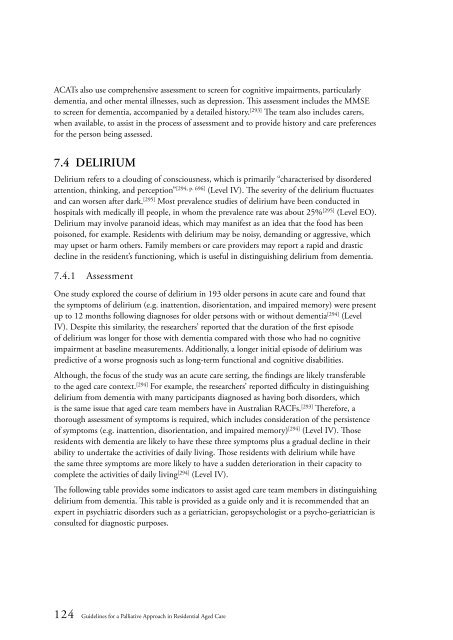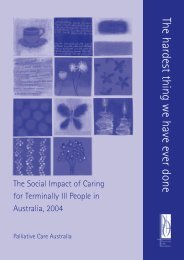Guidelines for a Palliative Approach in Residential Aged Care
Guidelines for a Palliative Approach in Residential Aged Care
Guidelines for a Palliative Approach in Residential Aged Care
You also want an ePaper? Increase the reach of your titles
YUMPU automatically turns print PDFs into web optimized ePapers that Google loves.
ACATs also use comprehensive assessment to screen <strong>for</strong> cognitive impairments, particularly<br />
dementia, and other mental illnesses, such as depression. This assessment <strong>in</strong>cludes the MMSE<br />
to screen <strong>for</strong> dementia, accompanied by a detailed history. [293] The team also <strong>in</strong>cludes carers,<br />
when available, to assist <strong>in</strong> the process of assessment and to provide history and care preferences<br />
<strong>for</strong> the person be<strong>in</strong>g assessed.<br />
7.4 DELIRIUM<br />
Delirium refers to a cloud<strong>in</strong>g of consciousness, which is primarily “characterised by disordered<br />
attention, th<strong>in</strong>k<strong>in</strong>g, and perception” [294, p. 696] (Level IV). The severity of the delirium fluctuates<br />
and can worsen after dark. [295] Most prevalence studies of delirium have been conducted <strong>in</strong><br />
hospitals with medically ill people, <strong>in</strong> whom the prevalence rate was about 25% [295] (Level EO).<br />
Delirium may <strong>in</strong>volve paranoid ideas, which may manifest as an idea that the food has been<br />
poisoned, <strong>for</strong> example. Residents with delirium may be noisy, demand<strong>in</strong>g or aggressive, which<br />
may upset or harm others. Family members or care providers may report a rapid and drastic<br />
decl<strong>in</strong>e <strong>in</strong> the resident’s function<strong>in</strong>g, which is useful <strong>in</strong> dist<strong>in</strong>guish<strong>in</strong>g delirium from dementia.<br />
7.4.1 Assessment<br />
One study explored the course of delirium <strong>in</strong> 193 older persons <strong>in</strong> acute care and found that<br />
the symptoms of delirium (e.g. <strong>in</strong>attention, disorientation, and impaired memory) were present<br />
up to 12 months follow<strong>in</strong>g diagnoses <strong>for</strong> older persons with or without dementia [294] (Level<br />
IV). Despite this similarity, the researchers’ reported that the duration of the first episode<br />
of delirium was longer <strong>for</strong> those with dementia compared with those who had no cognitive<br />
impairment at basel<strong>in</strong>e measurements. Additionally, a longer <strong>in</strong>itial episode of delirium was<br />
predictive of a worse prognosis such as long-term functional and cognitive disabilities.<br />
Although, the focus of the study was an acute care sett<strong>in</strong>g, the f<strong>in</strong>d<strong>in</strong>gs are likely transferable<br />
to the aged care context. [294] For example, the researchers’ reported difficulty <strong>in</strong> dist<strong>in</strong>guish<strong>in</strong>g<br />
delirium from dementia with many participants diagnosed as hav<strong>in</strong>g both disorders, which<br />
is the same issue that aged care team members have <strong>in</strong> Australian RACFs. [293] There<strong>for</strong>e, a<br />
thorough assessment of symptoms is required, which <strong>in</strong>cludes consideration of the persistence<br />
of symptoms (e.g. <strong>in</strong>attention, disorientation, and impaired memory) [294] (Level IV). Those<br />
residents with dementia are likely to have these three symptoms plus a gradual decl<strong>in</strong>e <strong>in</strong> their<br />
ability to undertake the activities of daily liv<strong>in</strong>g. Those residents with delirium while have<br />
the same three symptoms are more likely to have a sudden deterioration <strong>in</strong> their capacity to<br />
complete the activities of daily liv<strong>in</strong>g [294] (Level IV).<br />
The follow<strong>in</strong>g table provides some <strong>in</strong>dicators to assist aged care team members <strong>in</strong> dist<strong>in</strong>guish<strong>in</strong>g<br />
delirium from dementia. This table is provided as a guide only and it is recommended that an<br />
expert <strong>in</strong> psychiatric disorders such as a geriatrician, geropsychologist or a psycho-geriatrician is<br />
consulted <strong>for</strong> diagnostic purposes.<br />
124 <strong>Guidel<strong>in</strong>es</strong> <strong>for</strong> a <strong>Palliative</strong> <strong>Approach</strong> <strong>in</strong> <strong>Residential</strong> <strong>Aged</strong> <strong>Care</strong>
















